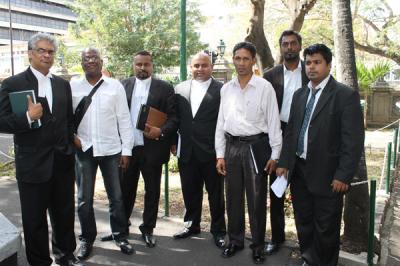Accompagnés de leurs hommes de lois, l’inspecteur Hector Tuyau et le sergent Jaylall Boojhawon ont décidé de loger une plainte contre l’État et le Commissaire de Police. Ils veulent que la Cour suprême déclare l’article 17 de la Police Act 1974 anticonstitutionnel. Mes Rama Valayden, Neelkanth Dulloo et l’avoué Me Kaviraj Bokhoree entendent bien défendre la thèse de la non-conformité avec l’article 13 de la Constitution sur le droit de se rassembler.
L’inspecteur Hector Tuyau et le sergent Jaylall Boojhawon ont saisi la Cour suprême hier pour contester un article de la Police Act 1974. Les deux policiers d’expérience, en compagnie de leurs conseils légaux Mes Rama Valayden, Neelkanth Dulloo et l’avoué Me Kaviraj Bokhoree, s’attaquent à l’article 17 de cette loi, qui stipule que les membres de la force policière n’ont pas le droit de se syndiquer.
Selon l’article 17 de la Police Act 1974 : « Police not to be members of a union (1) Subject to subsection (2), no police officer shall be a member of any trade union of employees, or of any association having for its objects the control or influence of the pay, pensions, or conditions of service of the Police Force. (2) Police officers may, for the purpose of bringing to the notice of Government all matters affecting their welfare and efficiency, establish a Police Federation. (3) Repealed (4) The Police Federation shall be independent of, and not associated with, any Organisation or person outside the Police Force. (5) Any police officer who contravenes subsection (1) shall commit an offence. (6) Where any question arises as to whether an Organisation is a trade union of employees or an association to which this section applies, the question shall be determined by the Tribunal. »
Les plaignants sont d’avis que l’interdiction de se syndiquer soulève plusieurs problèmes notamment pour de nouveaux uniformes, matériels pour le travail, conditions de travail et pour la paie. Ils ont aussi évoqué la frustration au sein de la force policière s’agissant des promotions.
Le vrai défi des policiers et de leurs hommes de loi sera de démontrer l’anticonstitutionnalité de cet article. En effet le deuxième chapitre de la Constitution garantit les droits fondamentaux et la liberté de l’individu. Son article 13 prévoit la protection du droit du citoyen à s’assembler et à s’associer. La Cour suprême devra ainsi trancher sur ce point qui pourrait, si accepté par les juges, rendre l’article 17 de la Police Act 1974 anticonstitutionnel. La Constitution étant la loi fondamentale de tout État, cet article serait alors déclaré caduc (NdlR : Null and Void).
L’article 13 de la Constitution stipule : « (1) Except with his own consent, no person shall be hindered in the enjoyment of his freedom of assembly and association, that is to say, his right to assemble freely and associate with other persons and, in particular, to form or belong to, trade unions or other associations for the protection of his interests. (2) Nothing contained in or done under the authority of any law shall be held to be inconsistent with or in contravention of this section to the extent that the law in question makes provision (a) in the interests of defence, public safety, public order, public morality or public health ; (b) for the purpose of protecting the rights or freedoms of other persons ; or (c) for the imposition of restrictions upon public officers, except so far as that provision or, as the case may be, the thing done under its authority is shown not to be reasonably justifiable in a democratic society. »
Par ailleurs, l’article 3 de l’Employment Relations Act 2008 confère aux membres de la Mauritius Prisons Service et de la Fire Services la possibilité de former des syndicats afin de protéger leurs droits. L’inspecteur Hector Tuyau et le sergent Jaylall Boojhawon veulent que la Cour suprême demande à l’État de revoir cet article de la Police Act afin de pouvoir défendre leurs droits.
SYNDICAT DANS LA FORCE POLICIÈRE: Deux policiers contestent la constitutionnalité de la Police Act
- Publicité -
EN CONTINU ↻


